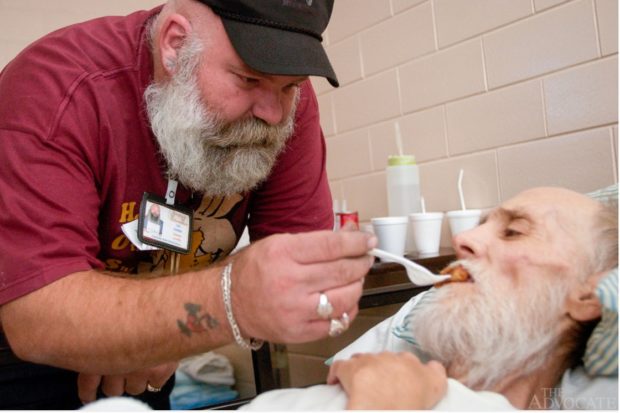
By Boston Woodard
A Massachusetts law passed in April allows the early release of dying prisoners. Alexander Phillips, housed in a medium-security prison in Norfolk, had his appeal for a compassionate release rejected. Phillips, a terminally ill cancer patient, the first to seek a release under the new law, is serving a 15- to 20-year sentence for manslaughter.
Massachusetts Department of Corrections (DOC) Commissioner Thomas Turco rejected Phillips’ appeal saying the 30-year-old dying prisoner is still a safety risk, even though his fate has been determined by numerous medical experts.
According to a report by Jenifer B. McKim, senior reporter with WGBH Boston’s New England Center for Investigative Reporting, Turco wrote in a letter to Phillips’ mother and lawyer, “First, let me express my sympathy concerning Mr. Phillips’ medical diagnosis.” Nevertheless, he went on to write, “Please be advised that I am denying your petition for Mr. Phillips’ medical parole at this time.”
Massachusetts Gov. Charlie Baker signed the law that allows the state to release prisoners who can “prove” they are terminally ill or incapacitated. Massachusetts became one of the last states in the nation to create “compassionate release,” so prisoners will be allowed to die beyond prison walls while saving taxpayers millions of dollars that would otherwise be used to pay for their medical care.
At 17%, Massachusetts’ proportion of prisoners 55 and older is considerably higher than the national average of 11%. The cost to house a maximum-security prisoner averages at $64,211 a year, while the state spends $283,749 per year to care for each sick prisoner.
According to McKim’s article, “Prisons across the U.S. are facing challenges of caring for a growing number of aging and ailing inmates.” A 2013 report by the Office of the Inspector General at the Department of Justice found that the federal compassionate release program was “poorly managed and implemented inconsistently,” allowing prisoners to die behind prison walls.
In 1984, Congress granted federal courts, via the Sentencing Reform Act (SRA), the authority to reduce prison sentences for “extraordinary and compelling” circumstances, after taking into account public safety and the purpose of punishment.
That authorization is commonly called “compassionate release” because it recognizes the importance of ensuring that “justice could be tempered by mercy.” Congress declared, “A prison sentence that was just when imposed could¾because of changed circumstances¾become cruel as well as senseless if not altered.”
According to the SRA law, Phillips’ medical condition rendered imprisonment “unjust and unfair” and qualified him for the release. The law acts as a “safety valve” to revisit sentences and reduce them “if appropriate.” The compassionate release option permits the courts to decrease sentences for applicable circumstances such as Phillips’.
In a case that made headlines in California, 81-year-old terminally ill cancer patient Bill Lambie, serving a life sentence for second-degree murder, was granted a compassionate release due to his age, medical condition and disciplinary-free time served. As the octogenarian prisoner lay dying in a cell at San Quentin state prison, Superior Court Judge Rodney A. Cortez of San Bernardino refused to sign Lambie’s release papers.
San Quentin’s (then) Dr. John Cranshaw traveled hundreds of miles to San Bernardino to testify at a hearing for Lambie’s release.
“I was really surprised he wasn’t released,” Cranshaw said. “Mr. Lambie clearly qualified for the compassionate release. One would think that after being thoroughly cleared by the California Department of Corrections and Rehabilitation (CDCR) and the state parole commissioner, Lambie would have been released. After all, they are the experts and who else would know whether someone is a danger to society.”
While he waited for an appeal his lawyer filed on the denial of his release by Judge Cortez, the frail Lambie said, “We don’t understand why I was not allowed the benefit of the doubt and given approval for the endorsed recommendation for my release. I regret the pain and anguish amassed as a result of my incarceration to both the victim’s family and my family.”
A few months later, Lambie succumbed to his illness and died in the California Medical Facility (CMF) state prison in Vacaville under the auspices of Pastoral Care Services (PCS) Director/Chaplain Keith Knauf.
According to Knauf, the CMF’s Hospice Care Unit was the first state prison hospice program in the country. In the mid-1980s, the AIDS epidemic ignited the proposal for a hospice unit at the CMF due to the many deaths¾well above 500 since its inception. This is California’s only hospice unit with a total of 18 beds. With 34 state prisons and more than 130,000 prisoners, many more beds are needed to accommodate those prisoners requiring hospice care. Chaplain Knauf said, “Since the Hospice Care Unit started, the men in its care are never alone.”
There are laws like compassionate release for eligible prisoners across the United States granted by Congress, via the Sentencing Reform Act, that are hardly used for dying men and women incarcerated nationwide. Men like Alexander Phillips and the late Bill Lambie are examples of the blatant disregard for a great humanitarian law¾compassionate release.
Marvin Mutch, the associate director of the Humane Prison Hospice Project and the director of advocacy for the Prisoner Reentry Network, believes every human being has the right to a dignified death.
“When speaking on end-of-life care, no one should be excluded. Dying with dignity is an essential component of our humanity and needs to be extended even into the shadows of our society where far too often there are those who will die alone,” he said.
When asked about those who believe that many in prison “deserve” to die badly, Mutch offered that, “Ultimately, how the sick and elderly die in our nation’s prisons say more about us as a society than anything they personally did to lose their freedom.”
*****
Boston Woodard is a prisoner/journalist who has been contributing to the Community Alliance since 2005. He is the author of Inside the Broken California Prison System (www.amazon.com). To learn more about Boston, contact marvinmutch@gmail.com.
